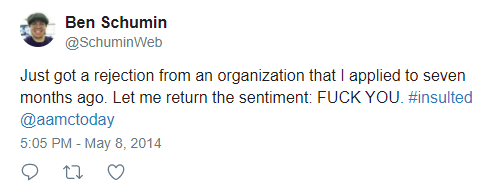I think this takes the cake for condescending job rejections…
9 minute read
September 17, 2017, 6:25 PM
If you’ve ever applied for a job, you’ve probably, at some point, received a rejection letter from a company. It’s that lovely little note that says “thanks, but no thanks” in a way that typically attempts to deliver the bad news while also attempting to soften the blow of said bad news. Most of them are fairly straightforward, but some people try a bit too hard to make people feel better in their rejections, usually to the opposite effect. On the /r/jobs board on Reddit, which I help moderate, this came through, which I believe takes the cake when it comes to rejection letters that try too hard to make people feel better:
Looking at my desk full of fantastic applications is like looking into a box full of puppies – you wish you could keep them all.
Unfortunately, this is not the case, and I’m sorry to tell you that your experience and skill set is not the perfect match we are looking for to fill this position.
I regret that I cannot give you a positive answer, but I have no doubt that there are many companies that will be thrilled to hear from a talented candidate like you.
We wish you all the best for your future endeavors and success finding the perfect match.
Best regards,
[Name]
I know what you’re thinking: did they really just compare jobseekers to a box of puppies? Yes, they did. They actually spoke to someone that way in a professional context. In their attempt to be cute and soften the blow of a job rejection, they make it fifty times worse – particularly that line that says, “no doubt that there are many companies that will be thrilled to hear from a talented candidate like you.” When you don’t have a job and are having trouble finding one, that sort of line really hurts. Even more so, the letter doesn’t say that they went with another candidate. Rather, it’s a problem with you. The problem is with you, and that’s why we’re rejecting your application.
I don’t know about you, but I really want to know what company this is, because that sort of nonsense needs to be called out for exactly what it is: condescending and unprofessional. If I ever spoke to someone like the person who wrote this rejection letter did, I guarantee you that I would find myself sitting across a table from my boss, being asked to explain the unprofessional manner in which I communicated with people. It is never a good idea to talk down to someone, no matter who they are.
When I worked at Food & Water Watch, I was the one who took care of job applications. I proofread the job ads (because my boss couldn’t be bothered to use spell check), I posted the job ads, I received the applications, and I forwarded the applications to the proper person for consideration. I was also the one who fielded calls and emails from applicants. I treated everyone well. Did you all receive my application? Let me see. What was your name? Yep – we got it, and it was forwarded on to the hiring manager on whatever date. I didn’t make the hiring decisions (because I certainly wouldn’t have hired a few of the clowns that I worked with), but at least I could confirm to applicants that their application was sent to the decision maker for consideration. A customer service mindset with job applicants goes a long way when it comes to maintaining a good reputation. People remember that.
One applicant who inquired in this way turned out to be an old friend from college, and we reconnected through that exchange. I didn’t recognize the name at first, and replied cordially, as always. I got a response back to the effect of, “Wait, are you the same Ben Schumin who was an RA in Potomac Hall?” So that was pretty awesome, though unfortunately, they didn’t get the job.
In any case, the best rejections are the short ones that communicate the necessary information without making extra effort to avoid hurt feelings. In other words, the drier the better. It’s not that they’re going out of the way to hurt people’s feelings, but they’re just not trying to soften the blow. When I was searching for a job back in 2013-2014, the best rejection letter was this one from Georgetown University:
Dear Applicant:
Thank you for applying to Georgetown University Campus Ministry’s office manager position. We are grateful for the interest of many qualified candidates. The position is now filled.
Sincerely,
Office of Campus Ministry
Georgetown University
Thank you for applying, but the position has been filled, sincerely, Georgetown. Nothing to it. No attempt to avoid hurt feelings. Just quick and to the point. It also was about a month after I applied, which was reasonable enough. I hadn’t heard anything, which either meant that I was not being considered for a position, or it was a slow process. Universities could go either way on speed of hiring process, and go quickly like a private company, or slowly like a public agency. In any case, okay, time to move on. It also didn’t hurt that I considered that position to be an unlikely prospect in the first place.
Then there’s this one, from Albemarle County, Virginia, where I had applied for some web position:
Dear Benjamin Schumin,
Thank you for your interest in working as a Communication Specialist with the County Executive’s Office. We appreciate your interest in Albemarle County Local Government. We had a number of qualified applicants and this was a difficult decision; however, after careful review of your application, other candidate’s background and skills more closely fit our current need.
We appreciate the time you invested in applying for our position. Please continue to review our current openings at www.albemarle.org/jobs for other positions you may wish to pursue.
Again, thank you for your interest in a career with Albemarle County. We wish you much success with your search.
Sincerely,
Kimberly Schick
HR Generalist
You know how, when you put your foot in your mouth and immediately realize it, your further attempts to mitigate it just make things worse, and you dig yourself into a deeper hole? There you are. This letter is just a trainwreck. Right out of the gate, they’re thanking you twice for applying: first for the position, and then for the county as a whole. And next comes the ham-handed attempts to avoid hurt feelings: “We had a number of qualified applicants and this was a difficult decision; however, after careful review of your application[…]” I don’t care about how many applicants you had. I don’t care how difficult your decision was. Just tell me “no” and let’s all move on. You’re not going to hurt my feelings by telling me “no”. Just rip the band-aid off and call it a day. Don’t peel it off slowly, because we all know that just hurts like hell, and prolongs the unpleasantness.
Then, of course, timing is key, too. For a private-sector or nonprofit organization, if you apply and don’t hear anything back within a week or two, it’s usually a good indication that the answer is “no”. Imagine my surprise to find this message in my inbox on May 8, 2014:
Dear Benjamin
Thank you for your interest in a position with the Association of American Medical Colleges.
We are fortunate to have many qualified candidates apply to each of our positions. We have reviewed the qualifications of each candidate and after careful consideration, we have determined that the qualifications of other candidates may better fit our needs at this time.
Please accept our best wishes and thank you for your interest in the Association of American Medical Colleges.
Warm regards,
Human Resources
I applied for this position on September 14, 2013. Trust and believe that I had written this organization off about a month after sending in the application, and moved on. This message seemed to just open up old wounds for no real purpose, since seven months and 24 days without a response is a clear indication of “no”. Plus they put in some wording that tells me that they tried to prevent hurt feelings, when, after seven months of silence, it was clear that they didn’t give a rat’s patootie. This sent me into a small rage, and I let them have it via social media:
Yeah, it was a little unprofessional for someone who, at that point, still didn’t have a job, but damn, if that didn’t feel good. I had also changed career trajectories by then, having gotten a CDL and moved my focus away from nonprofits and office work. And as things would work out, I would get hired by my current employer one week later.
Then there are some companies that have some major nerve. One place that I applied at was KIPP, a public charter school in DC. I applied for two positions with them, and got rejection notices for each of them a week later. It wasn’t that surprising, because they made high school and college GPAs a required field in their application. I don’t remember or care what either of those numbers are, and I also wasn’t going to go back and research them, because with high school and college’s at that time being 14 and 10 years in my past, respectively, it really didn’t matter anymore, because I wasn’t the same person that I was in high school or college anymore. So I fudged them as well as I could (i.e. I was in the ballpark, but not exact), but my old GPAs shouldn’t matter anyway. I suppose that any organization that judges a candidate on their high school or college GPA after they have a number of years of work experience is nowhere that one would want to work anyway. But that’s not the part where the nerve comes in. The last rejection email came on October 9, 2013. Now fast forward to May 22, 2014, when I got this email from them:
Hello,
I’m emailing you today on behalf of the KIPP Recruitment team. We’re assessing our application and hiring process and our records indicate that you looked into employment opportunities here within the past year. We would greatly appreciate it if you could take the time to answer a few questions about your experience. Your feedback is extremely valuable to us, and will help us better serve our candidates, students, and schools in the future.
Please click here to fill out the survey: KIPP Candidate Survey
The survey is for information-gathering purposes only. The survey is anonymous, and your responses will be kept completely confidential and private.
Thank you for your interest in KIPP and for sharing your feedback with us.
Sincerely,
Sheila Sarem
KIPP Recruitment Team
And then I got a second email from Sarem on May 30:
Hello,
If you have already filled out the KIPP Candidate Survey, we are extremely grateful! Thank you for your time.
If you have not yet filled it out, this is a quick reminder. I’m emailing again on behalf of the KIPP Recruitment team. We’re assessing our application and hiring process and our records indicate that you looked into employment opportunities here within the past year. We would greatly appreciate it if you could take the time to answer a few questions about your experience, regardless of where you are in the application process. The survey is for information-gathering purposes only and your responses will be kept completely confidential and private.
To access the survey, please click here: KIPP Candidate Survey
The survey is being administered by the KIPP Foundation, the national organization that supports KIPP Schools. All hiring decisions are made at the local level by individual KIPP schools and regions. If you have a question about your application status, please use our School Directory to follow up directly with the school or region where you applied.
Thank you for your time. Your feedback is extremely valuable to us, and will help us to better serve our candidates, students, and schools in the future.
Sincerely,
Sheila Sarem
KIPP Recruitment Team
It was bad enough that they sent the survey in the first place. But then they sent a reminder, like I was obligated to complete their stupid survey, and this was a reminder of my obligation. I’m sorry, but I don’t see where completing your survey benefits me. It’s like an exit interview, in that there is nothing in it for the person completing it. I no longer have any sort of association with your organization, and you’re not paying me for my time. I laughed at it, while being amazed that an organization would think that they were so important that people would drop everything and respond to their survey when they wouldn’t even give you the time of day.
Of course, I don’t understand why so many companies will treat jobseekers like they are lower than scum in the first place. People remember bad experiences. When I was driving a bus, some of the routes that I did took me past the headquarters building for the Association of American Medical Colleges, as well as some KIPP schools. I remembered how I was treated by them every time I went past their facilities. It’s why I advocate treating job applicants like customers – because you never know when your paths may cross again. The idea is that today’s unsuccessful jobseeker may very well be in a position to do business with the company tomorrow. Or the tables may be completely turned one day, i.e. if I’m in a position to hire you and you are applying for a position that I am responsible for filling. If you were mean to me the last time we had a contact, I wouldn’t hire you. It’s like they say – the true mark of a person’s character is how they behave towards people who they consider beneath them.
And then too many jobseekers enable such poor treatment by expressing their gratitude for receiving any sort of response. Regarding the original message, one person said, “[S]till 100x better than no response, so I’d say let them do what they want.” I saw other responses in the same thread expressing similar sentiment. I don’t see it that way. First of all, it makes jobseekers look like beggars, fighting for any scrap of feedback, no matter how unprofessional it may be. And it gives people in charge of hiring processes carte blanche to treat people poorly because it’s considered better than nothing. Actually, silence is better than an unprofessional communication. Just like how, in hindsight, there have been a few job interviews that I went to that I should have walked out of because it was clear that there was no way that I would ever want to work for those people.
In the end, I suppose it’s a sad commentary on how low our standards have become when it comes to finding work. I’m satisfied that, when I was in a situation to interact with jobseekers, I always maintained the utmost in professionalism, but I’m disappointed about how many others don’t have the same level of professionalism.










